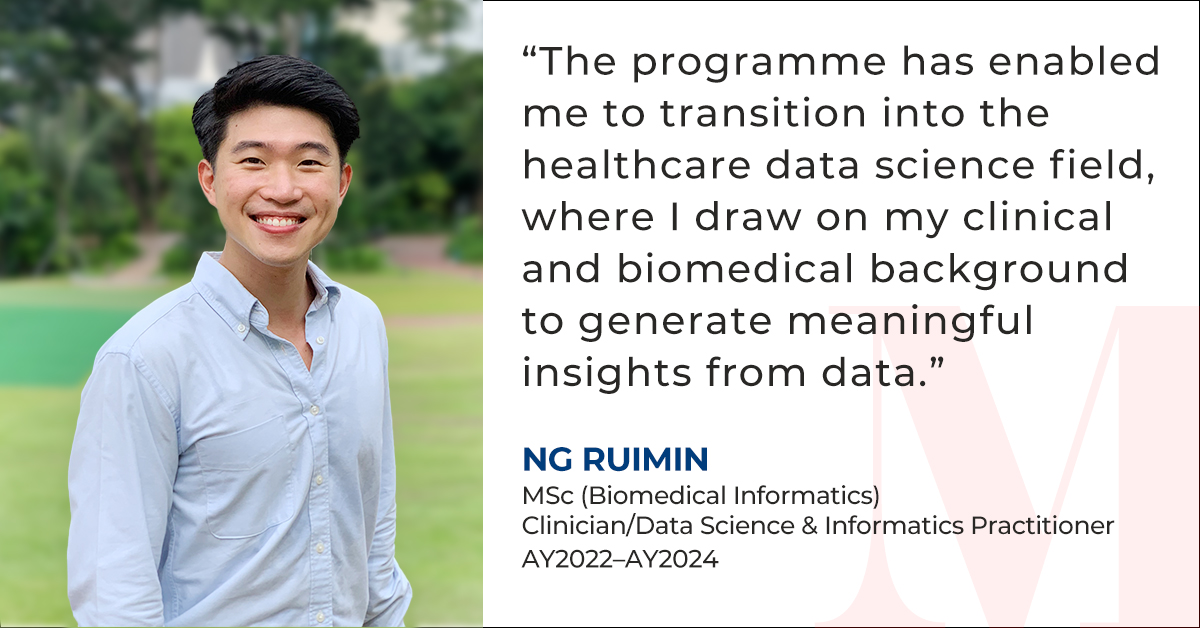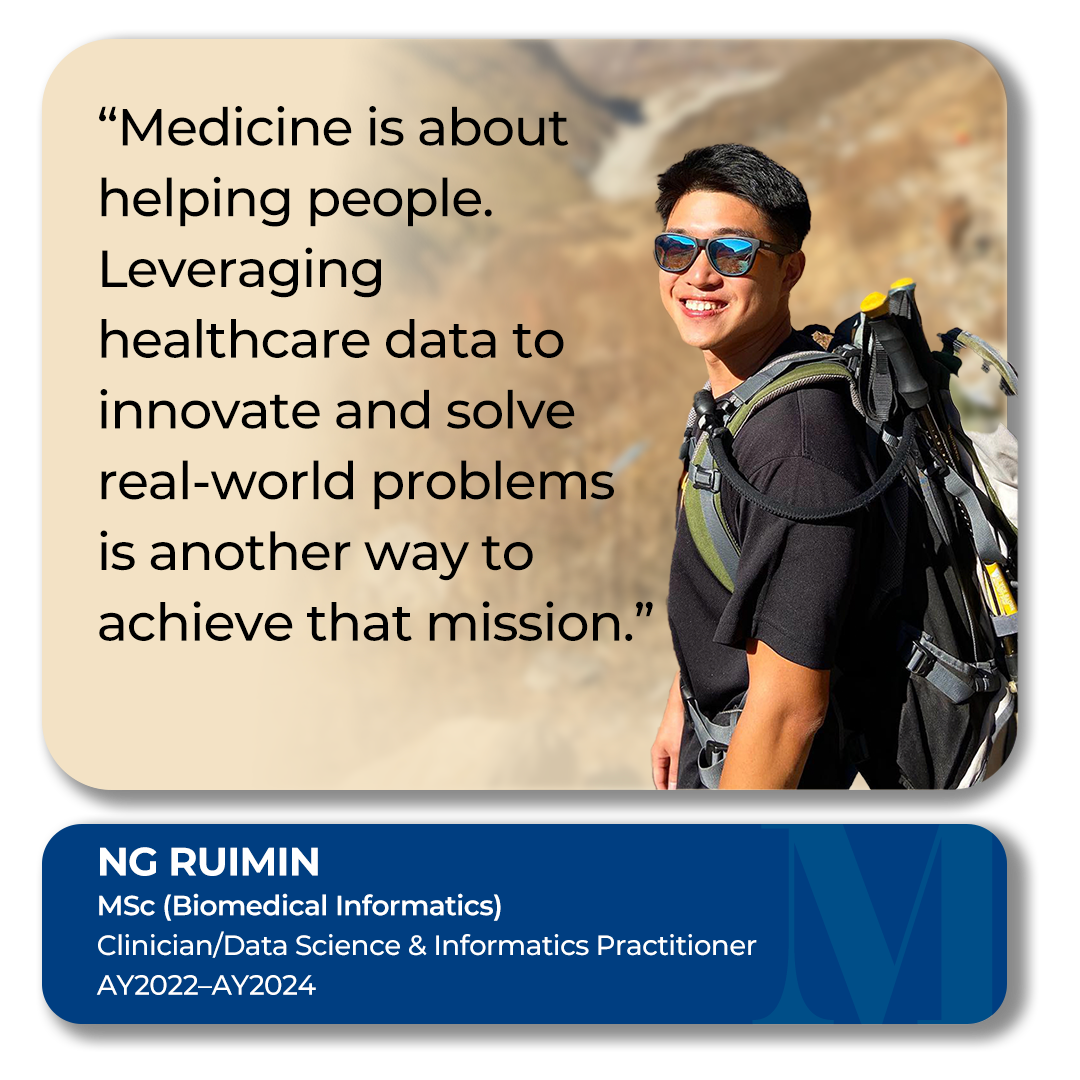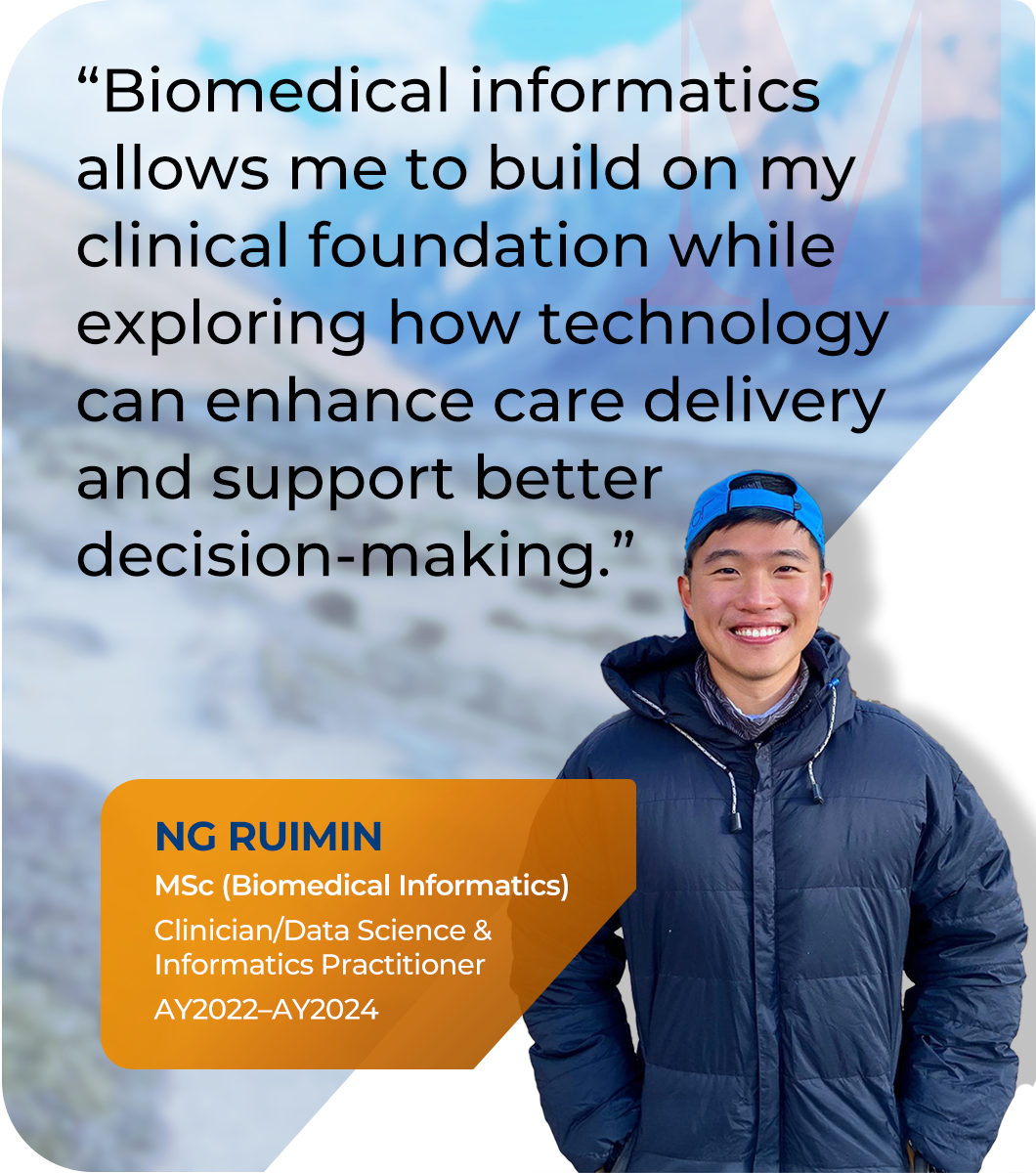We speak to Dr Ng Ruimin, a graduate of the Master of Science (MSc) (Biomedical Informatics) programme, to learn what motivated him to pursue an area of study outside the traditional medical field, and to get his perspectives on what the degree means to him.
Hello Ruimin! Thank you for speaking with us. Please introduce yourself to our readers.
Ng Ruimin: I am a practising doctor, currently working at the Singapore General Hospital (SGH). These past few years, I have done my rotations through different medical and surgical specialities at various public hospitals in Singapore. I took up the MSc (Biomedical Informatics) programme at the National University of Singapore (NUS) in 2022 and graduated in 2024.
Why did you decide to take up biomedical informatics instead of pursuing a medical specialisation?
I have always had a strong interest in technology and its potential to transform patient care. Over time, I began to see the intersection of healthcare and data not just as a technical field, but as a powerful avenue to contribute meaningfully to the goals of medicine. At its heart, medicine is about helping people — and leveraging healthcare data to innovate and solve real-world problems is another way to achieve that mission.
This mindset was a key reason I chose to pursue biomedical informatics over a traditional medical specialisation. I have long been drawn to data science, and its expanding role in healthcare presents exciting opportunities to improve systems and outcomes on a broader scale. Biomedical informatics allows me to build on my clinical foundation while exploring how technology can enhance care delivery and support better decision-making. That blend of purpose and innovation is what makes this path especially fulfilling for me.

How has the MSc (Biomedical Informatics) programme helped you?
The programme has enabled me to transition into the healthcare data science field, where I draw on my clinical and biomedical background to generate meaningful insights from data. I am now able to approach healthcare challenges from multiple perspectives — as a doctor, clinical informatician and data scientist — bridging clinical understanding with analytical expertise to contribute more effectively to data-driven healthcare solutions.
It has also strengthened my ability to collaborate across disciplines and serve as a bridge between data analysts, clinicians and medical administrators. Healthcare is inherently a team effort — not just at the bedside, but also behind the scenes. Much of what makes effective care possible depends on the contributions of individuals who may not be front-facing, such as health informaticians, data engineers, information technology professionals and administrative staff. These behind-the-scenes team members, who come from a wide range of technical and professional backgrounds, play a crucial role in supporting clinical decision-making and operational efficiency. Through the MSc (Biomedical Informatics) programme, I have gained a deeper appreciation for the unique value each group brings. This has equipped me to foster clearer communication, align goals and enhance collaboration across multi-disciplinary teams.

You are currently working in SGH. How has the organisation supported your studies?
I am grateful to my superiors and department colleagues at SGH for making it possible for me to pursue a further education. By readily approving my leave requests and allowing flexibility to study for examinations and attend lessons, they graciously ensured that I had the time to concentrate fully on my studies.
In addition, on knowing that my field of study was in data science and informatics, my superiors connected me to other departments within the hospital, whose work was aligned to my studies. Through these introductions that I was able to gain a better understanding of the Singapore healthcare data system, as well as build networks with like-minded, talented individuals.
What area of biomedical informatics did you choose to specialise in, and what course stands out from your time in the programme?

During my time in the MSc (Biomedical Informatics) programme, I chose to specialise in the Analytics track. My decision stemmed from a strong interest in the technical and data-driven aspects of biomedical informatics. I was particularly drawn to how data science intersects with healthcare — offering powerful tools to generate insights, improve patient care and support evidence-based decision-making. The vast and dynamic nature of biomedical data, combined with the intricacies of clinical environments, makes this field both challenging and intellectually stimulating.
What sets healthcare apart from other domains is its unique set of constraints — ethical considerations, regulatory requirements and the high stakes involved in patient outcomes. These complexities demand more than just technical proficiency; they require a deep understanding of context and an ability to develop innovative, practical solutions. Pursuing the Analytics specialisation allowed me to build strong foundations in data analytics, machine learning and statistical modelling, all while applying them meaningfully within the healthcare domain. My aim was to equip myself with the necessary tools to advance the field of biomedical informatics and contribute to data-driven improvements in healthcare delivery.
One course that I particularly enjoyed and found impactful was Advanced Statistical Learning (SPH6004). It played a key role in deepening my understanding of machine learning techniques, especially in the context of healthcare applications. The course was well-organised, thoughtfully paced and delivered in a highly interactive format. Lessons encouraged active participation, and my classmates’ engagement made the learning environment dynamic and collaborative. We often learnt from each other’s questions and discussions, which helped to clarify concepts and reinforce key ideas. The course content struck a strong balance between theory and practice — challenging us to develop a machine learning solution for a real-world healthcare problem using a de-identified, anonymised dataset. Overall, the course significantly enhanced my ability to apply statistical learning methods to complex, data-driven problems in healthcare.
What have you been busy with since graduating in 2024?
Since my graduation, my role has evolved to include responsibilities in both clinical informatics and data science at SGH, where I draw on my background as a “bilingual” clinician—fluent in clinical care, biomedical informatics and data science—to bridge the gap between frontline healthcare and technological innovation.
My work involves collaborating with diverse stakeholders across the healthcare ecosystem to thoughtfully design data capture processes and clinical databases optimised for downstream analytics. I also work closely with analysts to understand healthcare data and workflows, and to develop and deploy machine learning solutions and pipelines using agile, iterative approaches inspired by software development — adapted to the unique challenges and constraints of the healthcare setting. By aligning clinical operations with data science principles, I help translate research insights and machine learning advances into practical, implemented solutions that deliver measurable value to the organisation. Through this work, I strive to ensure that innovation in healthcare is not only insightful, but truly actionable and impactful.
Why choose the MSc (Biomedical Informatics) programme at NUS?
- Make the most of the advantages of an academic medical centre, where service, education and research converge — such as access to real-time desensitised healthcare data from actual healthcare institution settings.
- Be on the frontlines of technological development and get access to some of the latest tools in biomedical informatics, as Singapore expands its footprint in digital medicine.
- Get intensive hands-on experience from internships with prestigious companies, working on potential clinical applications with the goal of improving patient care.
Read more about the programme here: MSc (Biomedical Informatics)